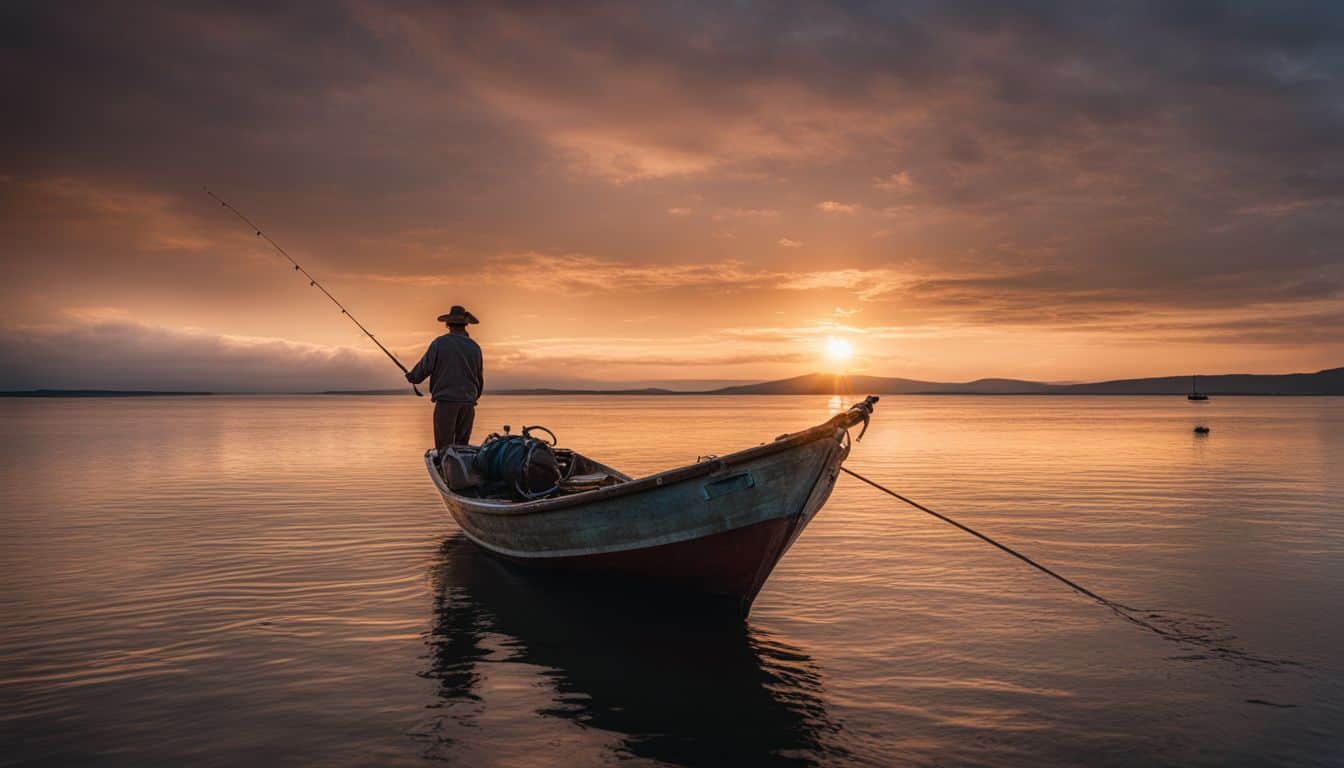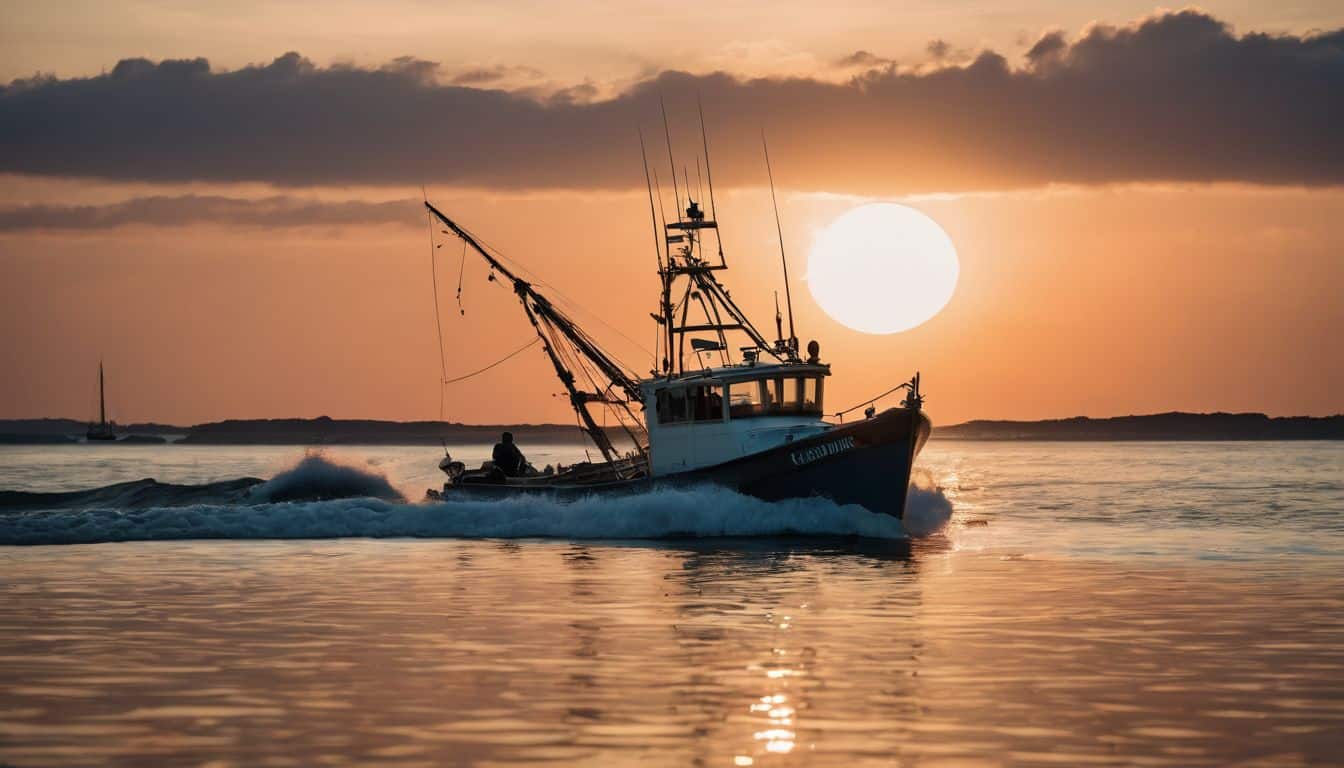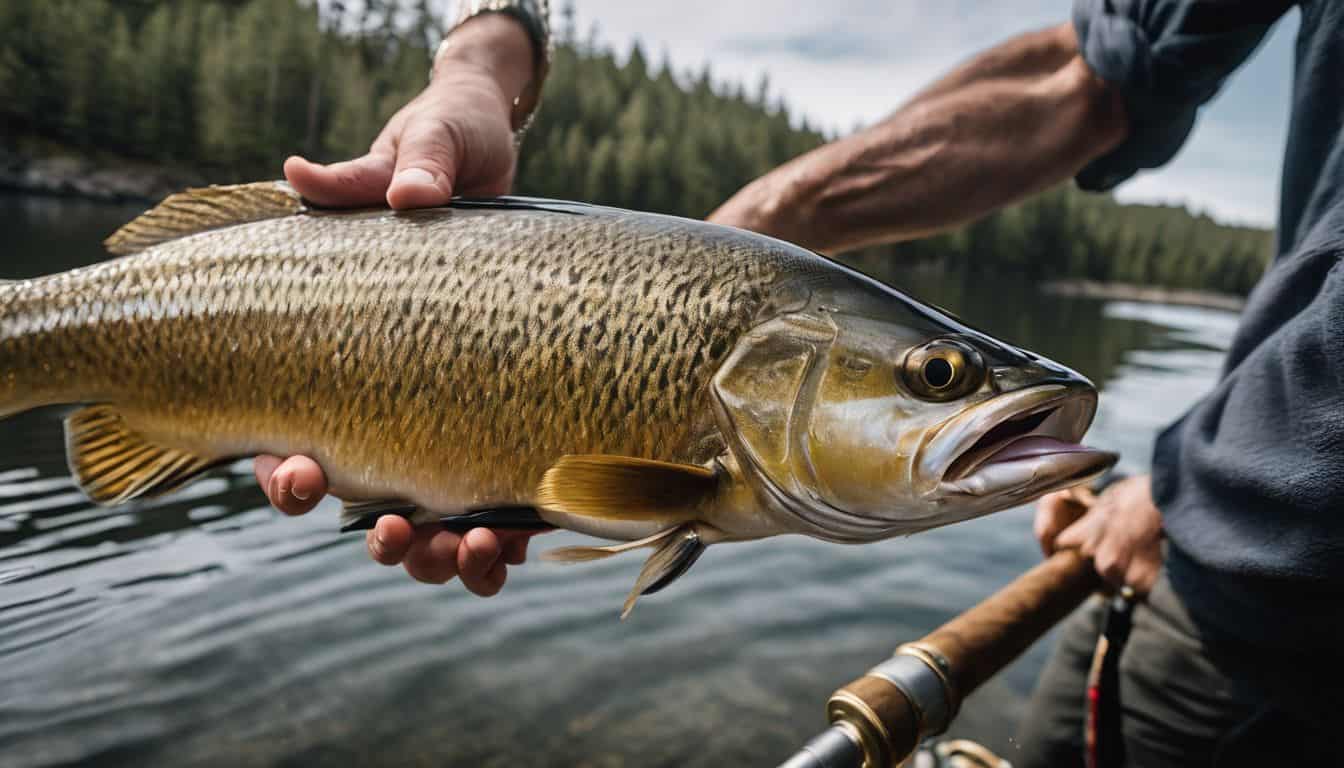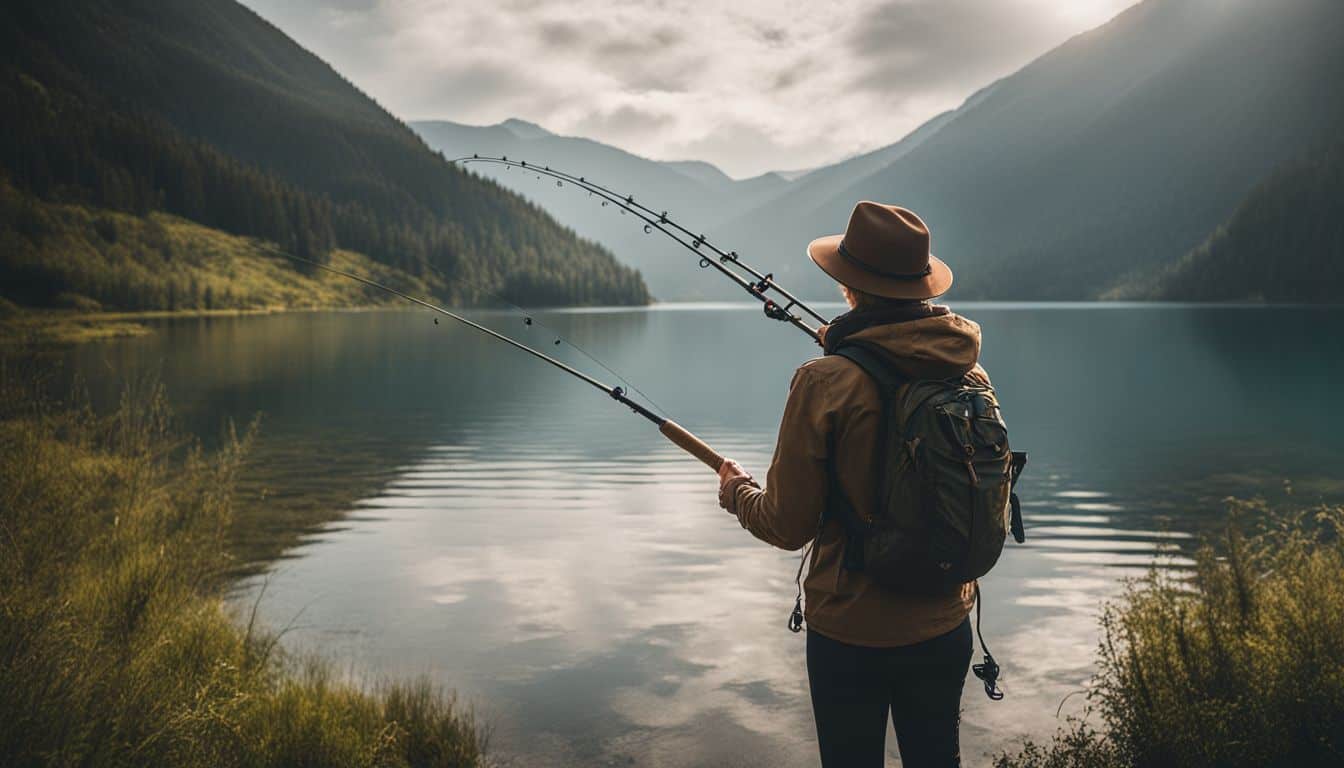Choosing the perfect fishing boat can feel like navigating a stormy sea, with waves of decisions threatening to capsize your peace of mind. Have no fear; I understand this journey full well.
After extensive research and candid conversations with hardened anglers and revered boating gurus, I’ve crafted this article as your guiding lighthouse amidst the foggy labyrinth of fishing boat selection.
So, are you ready to conquer the sea and master the art of choosing your ideal fishing boat? Come on board!
The Importance of Choosing the Right Fishing Boat
Picking the right fishing boat is like finding a key to treasure. It can make your fishing trips fun and full of big catches. The boat must have enough room for all people on board.
So, think about how many friends or family members will join you.
The type of fish you want to catch also matters! This will tell you what kind of boat to get. You should also know where you’ll be fishing – in calm lakes, rough seas or flowing rivers? Each place needs a different type of boat.
Don’t forget about important stuff like rod holders and baitwells either. These are needed when we go out to sea with our hooks and baits.
Considerations for Selecting a Fishing Boat
When selecting a fishing boat, it is important to consider factors such as size and capacity, stability, construction material, engine power, and storage space.
Size and capacity
Big boats can take on more people. If you love to fish with friends, get a larger boat. But remember, big boats need deeper water. They won’t work in shallow spots.
Small boats have their own perks as well. They are easy to move and good for one or two people. To meet your needs, pick the right size of boat based on where you will fish and how many will join you.
Stability
Stability is a must for any fishing boat. It keeps you safe and makes sure the boat won’t flip over. A stable boat also lets you stand up to fish, which is helpful for kayak anglers.
Even if the water gets rough, a steady fishing platform helps you keep your balance. Look at things like size, weight capacity, and hull type when picking out your boat to make sure it’s steady enough.
Construction material
When choosing a fishing boat, one important consideration is the construction material. Different materials offer varying levels of durability and performance. Fiberglass boats are popular due to their strength, low maintenance, and smooth ride.
Aluminum boats are lightweight, easy to maneuver, and resistant to corrosion. Wooden boats have a classic look but require more upkeep. Each material has its advantages and disadvantages, so it’s essential to think about your specific needs and preferences when selecting the construction material for your fishing boat.
Engine power
Choosing the right engine power for your fishing boat is crucial. Engine power plays a key role in controlling fishing effort and determining fleet size. If you’re concerned about reselling your boat, focus on basics like boat size and engine power.
When it comes to motors for small boats or dinghies, consider the mid-range horsepower that’s halfway between 2.5 hp and the maximum listed horsepower. There are tools available to help determine the appropriate motor size for your boat, such as calculators and charts specifically designed for this purpose.
So make sure you choose an engine with enough power to meet your needs while also considering factors like fuel efficiency and cost-effectiveness.
Storage space
Having enough storage space on your fishing boat is crucial for keeping all of your gear organized and protected. When selecting a fishing boat, make sure to consider the size and layout of the storage compartments.
This will ensure that you have enough room to store your tackle box, fishing rods, reels, and other equipment. Having dedicated storage compartments will also allow you to easily access everything you need while out on the water.
Additionally, having ample storage space onboard means that you can carry extra equipment and supplies for different fishing techniques and conditions. So when choosing a fishing boat, keep in mind the importance of having sufficient storage space to enhance your overall fishing experience.
Proven Tips for Fishing Boat Selection Mastery
As a fishing enthusiast, I want to share some proven tips to help you master the art of selecting the right fishing boat. Here they are:
- Size and capacity: Consider the number of people you’ll be fishing with and the amount of gear you’ll need to bring. Make sure the boat is spacious enough to accommodate everyone comfortably.
- Stability: Look for a boat that offers good stability, especially if you plan on fishing in rough waters or standing up while casting.
- Construction material: Choose a boat made from durable materials like aluminum or fiberglass that can withstand the elements and last for many years.
- Engine power: Determine how much horsepower you’ll need based on the type of fishing you’ll be doing and the size of the body of water you’ll be navigating.
- Storage space: Opt for a boat with ample storage compartments to keep your fishing gear organized and easily accessible.
Types of Fishing Boats
Bass boats, jon boats, pontoon boats, offshore fishing boats, and kayaks and canoes – there are so many options to choose from when it comes to fishing boats. But which one is right for you? Read on to explore the different types of fishing boats and find the perfect match for your angling adventures.
Bass boats
I love fishing with bass boats! They are perfect for bass fishing because they’re fast, easy to maneuver, and can go in shallow waters. Bass boats have a low profile and a flat bottom that allows them to glide through the water smoothly.
These boats come equipped with special features like livewells to keep your catch fresh, trolling motor systems for precise control, and rod lockers to store all your fishing gear.
If you enjoy freshwater fishing for bass or similar species, a bass boat is definitely worth considering!
Jon boats
I love Jon boats because they are simple, affordable, and perfect for fishing. These boats have a flat or nearly flat bottom, which makes them stable on the water. They are small and lightweight, making them easy to transport and maneuver in tight spaces.
Jon boats are commonly used in shallow freshwater areas like rivers and lakes. The best thing about these boats is their versatility – you can customize them with various accessories to suit your fishing needs.
Whether you want to add rod holders or a trolling motor, Jon boats give you the freedom to create your perfect fishing setup. So if you’re looking for an affordable and customizable boat for your fishing adventures, consider getting a Jon boat!
Pontoon boats
Pontoon boats are a great choice for fishing because they have large decks and offer good stability. They may not be as fast as V hull fishing boats, but they handle well in choppy conditions and moderate waves.
Pontoon boats are best suited for calm waters and may not perform well in big-wave environments. However, they come equipped with features helpful for fishing trips, such as comfortable seating, ample storage space, fishing rod holders, and a livewell for bait and fish.
So if you’re looking for a stable boat with plenty of room to move around while you fish, consider a pontoon boat.

Offshore fishing boats
Offshore fishing boats are designed for deep-sea fishing adventures and rough sea conditions. These boats, like center consoles, sportfishing yachts, and walkarounds, are perfect for fishing in deep waters.
They have larger hulls and powerful engines to ensure stability and speed while out at sea. With advanced navigational and fish-finding technology, offshore fishing boats help locate fish even in deep waters.
So if you’re looking for an exciting deepwater fishing experience or love going on offshore fishing adventures, an offshore fishing boat is the way to go!
Kayaks and canoes
Kayaks and canoes are two different types of fishing vessels. Canoes are larger and offer more comfort for those who prefer a bigger boat. They have more storage space and can accommodate multiple passengers.
On the other hand, kayaks are smaller and narrower, typically propelled by a double-bladed paddle. They provide a more intimate boating experience and allow for greater maneuverability in shallow waters.
The word “kayak” originates from the Inuit language, reflecting their long history as an essential means of transportation in Arctic regions. Comparing kayaks and canoes is a good starting point for selecting the right fishing boat that suits your needs and preferences.
Tips for Evaluating Fishing Boats
When evaluating fishing boats, it’s important to do your research and compare different options. And that’s just the beginning! There are test rides, inspections, and seeking professional advice to consider as well.
Want to learn more? Keep reading for expert tips on selecting the perfect fishing boat for you!
Research and comparison
When it comes to choosing the right fishing boat, research and comparison are key. It’s important to take the time to gather information about different types of fishing boats and compare their features, size, stability, construction material, engine power, and storage space.
By doing your homework before making a decision, you can narrow down your options based on your specific needs and preferences. This will ensure that you find a fishing boat that suits your requirements and helps you have a successful and enjoyable fishing experience.
So don’t rush into buying a boat without researching and comparing different options available in the market!
Test ride and inspect boats
When looking to buy a fishing boat, it is essential to test ride and inspect the boats before making a decision. This allows you to get a feel for how the boat handles on the water and ensures that everything is in good working order.
During the test ride, pay attention to how easily the boat maneuvers and if there are any issues with engine performance or stability. Inspecting the boat thoroughly will help you identify any potential problems, such as leaks or damage, which could affect your fishing experience down the line.
By taking the time to test ride and inspect boats, you can make an informed choice and select a fishing boat that meets your needs and preferences.

Consider fishing-specific features
When choosing a fishing boat, it’s important to consider the features that are specifically designed for fishing. These features can make your fishing experience more enjoyable and successful.
Some key features to look for include fishing rod holders, which allow you to easily store and access your rods while out on the water. Fuel capacity is also important, as it determines how far you can travel before needing to refuel.
Storage space is essential for keeping your gear organized and easily accessible. Live wells are another useful feature, as they provide a place to keep live bait or store caught fish until you’re ready to release them.
Seek professional advice
When it comes to selecting a fishing boat, seeking professional advice is crucial. Consulting with experts who have specialized knowledge and experience can help ensure that you make the right choice for your specific needs.
They can provide informed recommendations and expert opinions based on their expertise in evaluating fishing boats.
By seeking professional advice, you can avoid potential mistakes or oversights in boat selection. Whether you’re inexperienced or simply unfamiliar with the process, consulting with experts can help guide you through the various considerations and options available.
They can assist you in researching and comparing different boats, testing them out, and evaluating fishing-specific features to find the perfect fit for your fishing adventures.
Budgeting for a Fishing Boat
When budgeting for a fishing boat, it is important to consider not just the initial purchase cost, but also the ongoing maintenance and operating expenses, as well as insurance and registration fees.
Initial purchase cost
When budgeting for a fishing boat, one important cost to consider is the initial purchase cost. This refers to the amount of money you will need to spend upfront to buy the boat. It includes payments for the boat itself and any additional equipment or accessories that come with it.
The initial purchase cost can vary depending on factors such as the size and type of boat you choose. It’s important to do your research and compare prices from different sellers to ensure you are getting a fair deal.
Keep in mind that while buying a new boat may have a higher initial cost, it could save you money in the long run due to lower maintenance and repair expenses compared to an older boat.
Maintenance and operating expenses
Maintaining and operating a fishing boat can come with some costs. You’ll need to budget for things like insurance, storage fees, maintenance and repairs, mooring fees, and any upgrades or replacements you may need.
The amount you spend on maintenance and repairs will depend on the age and condition of your boat. Insurance costs can vary based on factors like the value of your boat and the coverage options you choose.
If you store your boat at a marina or other facility, there may be mooring fees or storage costs involved. And don’t forget about any upgrades or replacements for your fishing gear that might add to your expenses.
Insurance and registration fees
Owning a fishing boat comes with expenses like insurance and registration fees. Boat registration is mandatory, so you need to make sure your boat is properly registered. This helps ensure that you can legally use your boat on the water.
Insurance for your fishing boat is also important because it can help cover the costs of repairs if something goes wrong. The cost of boat insurance will depend on factors like the size and value of your boat.
On average, people pay between $200 to $500 per year for boat insurance. It’s important to budget for these expenses when considering buying a fishing boat.
Financing Options for Fishing Boats
Looking to finance your fishing boat? Explore different options like loans, financing plans, and leasing. Read on to discover the best options for you!
Loans and financing plans
When it comes to buying a fishing boat, you may need some help with financing. Thankfully, there are different options available for loans and financing plans. It’s important to research and compare different lenders who specialize in the marine industry.
They can often process paperwork faster for pre-owned boats. You can consider low-interest boat loans or adjustable-rate loans depending on your financial situation. Also, take into account the interest rates offered by different lenders and any extended warranties they might provide.
By exploring these options, you can find the best financing plan that suits your needs and helps you get out on the water with your new fishing boat in no time.
Leasing options
When it comes to financing a fishing boat, there are different options available, including leasing. Leasing allows you to use the boat for a specific period of time while making regular payments.
It can be a good choice if you don’t want to commit to long-term ownership or if you prefer the flexibility of upgrading your boat in the future. However, it’s important to consider the terms and conditions of the lease agreement and understand any potential fees or restrictions that may apply.
It’s also advisable to compare leasing options from different providers to ensure you’re getting the best deal for your needs and budget. So, before making a decision on how to finance your fishing boat, take some time to explore leasing as an option and see if it fits your preferences and requirements.
Used boat considerations
When considering purchasing a used fishing boat, there are important factors to keep in mind. One of the main things to consider is your budget. Think about how much you can afford to spend on a used fishing boat, taking into account not just the purchase price but also ongoing maintenance and operating expenses.
It’s also essential to evaluate your financial stability before making a decision. Lenders often look at factors such as your credit score, debt-to-income ratio, net worth, job stability, and homeownership stability when providing financing for a used boat.
So make sure you’re financially prepared before going ahead with the purchase. Additionally, don’t forget to compare different fishing boat models and consider their size, features, and brand reputation to ensure you find the best fit for your needs and preferences.
Preparing for Boat Ownership
When preparing for boat ownership, it is important to take into consideration the safety equipment and training that will be necessary. Additionally, researching and understanding licensing and registration requirements is essential in order to ensure compliance with legal regulations.
Finally, establishing a plan for boat maintenance and storage will help keep your fishing boat in peak condition for years to come.
Safety equipment and training
As a fishing enthusiast, it’s important to prioritize safety when out on the water. Having the right safety equipment on your fishing boat can make all the difference in case of an emergency.
Make sure you have items like life jackets, fire extinguishers, navigation lights, and distress signals onboard at all times. It’s also crucial to undergo proper training in boating safety to ensure that you know how to handle different situations and emergencies that may arise while fishing.
By being prepared with the necessary safety equipment and training, you can enjoy your fishing trips with peace of mind knowing that you’re well-prepared for any unexpected situations.
Licensing and registration requirements
As a fishing enthusiast, it’s important to know about the licensing and registration requirements for owning a boat. When you own a boat, you’ll need to file for boating registration and obtain a license plate for your boat trailer.
This helps ensure that your boat is properly identified and can be traced back to you. If you own a powerboat, there are specific registration requirements that vary from state to state.
It’s also important to understand reciprocity between states when it comes to registering your boat. When buying or selling a boat, make sure to transfer the boat title correctly. In some cases, like operating “inspected” vessels that carry more than 6 passengers, you may need to obtain a Master license.
Boat maintenance and storage
Proper boat maintenance and storage are essential for keeping your fishing boat in good condition. Regular upkeep, such as cleaning the exterior and interior, checking for any damages or wear, and performing routine maintenance tasks, will help extend the life of your boat.
It is also important to follow the guidelines outlined in your Owner’s/Operator’s Manual regarding proper operation, maintenance, and care.
When it comes to storage, there are several options available. You can choose to store your boat at home if you have enough space, but make sure it is protected from the elements and securely stored.
Alternatively, you can look for boat storage facilities that offer covered or indoor storage options. Keep in mind that boat storage costs may vary depending on the location and the type of facility.
Remember to consider safety regulations when storing your boat as well. Make sure you comply with Coast Guard requirements for boats of different sizes to ensure both compliance and safety.
Tips for a Successful Fishing Boat Purchase
When purchasing a fishing boat, it is essential to negotiate the price and try to get the best deal possible.
Negotiating the price
When it comes to negotiating the price of a fishing boat, there are a few key tips to keep in mind. First, it’s important not to undervalue your own boating needs just to get a lower price.
Instead, make a reasonable offer understanding that there will be some negotiation involved. When counter-offering, consider offering close to the asking price or showing some willingness to negotiate further.
It’s also worth noting that if you’re purchasing from a sales representative, they often have experience with negotiations, so be prepared for that aspect. Overall, remember that negotiation is an important part of the boat-buying process and can help you get the best value for your purchase.
Obtaining a thorough inspection
When purchasing a fishing boat, it’s crucial to obtain a thorough inspection to ensure that the boat is in good condition and suitable for your fishing needs. Inspecting the tachometer and water pressure gauges on a used bass boat can provide important insights into its overall condition.
Additionally, it’s essential to check for any signs of damage or wear on the hull, propeller, and engine. Remember to also inspect the electrical systems, fuel tanks, and safety equipment onboard.
By conducting a comprehensive inspection, you can make an informed decision and avoid potential issues down the line.
Reviewing warranty and service options
When buying a fishing boat, it’s important to review the warranty and service options available. Make sure to check if there is a warranty for your specific type of fishing boat, whether it’s designed for freshwater or saltwater use.
Understanding the terms and coverage of the warranty will give you peace of mind knowing what repairs and services are included. Additionally, read through the owner’s manual to learn about any maintenance requirements or recommendations that may affect your warranty.
By researching and reviewing these options beforehand, you can avoid potential issues down the line and ensure a smooth ownership experience with your fishing boat.
Conclusion on Proven Tips For Fishing Boat Selection
In conclusion, selecting the right fishing boat is crucial for a successful and enjoyable fishing experience. By considering factors such as size, stability, construction material, engine power, and storage space, you can find the perfect boat that meets your needs.
Additionally, conducting research, test riding boats, seeking professional advice, and budgeting properly will ensure a smooth fishing boat purchase. With these proven tips in mind, you’re on your way to mastering fishing boat selection!
FAQs on Proven Tips For Fishing Boat Selection
1. What factors should I consider when selecting a fishing boat?
When selecting a fishing boat, you should consider factors such as the type of fishing you plan to do, the size of the boat, its stability and maneuverability, storage capacity for equipment, and your budget.
2. Is it necessary to have a specialized fishing boat for fishing?
No, it is not necessary to have a specialized fishing boat for fishing. You can use various types of boats such as kayaks or small motorboats depending on your preferences and the type of water you will be fishing in.
3. How do I determine what size of boat is suitable for my needs?
To determine the appropriate size of a fishing boat, consider factors such as how many people will typically be on board, the amount of gear and supplies you will bring, and whether you plan to fish in calm waters or venture into larger bodies of water.
4. Are there any safety measures I should take while using a fishing boat?
Yes, it’s important to follow safety measures while using a fishing boat. This includes wearing life jackets, checking weather conditions before heading out on the water, bringing emergency supplies like flares or signaling devices, and informing someone about your boating plans.
5. Can I rent or borrow a fishing boat instead of buying one?
Yes! If you’re unsure about investing in a new boat or don’t want to deal with maintenance costs, renting or borrowing a fishing boat from friends or local rental services can be an affordable option that allows you to enjoy your time on the water without long-term commitments.





Leave a Reply